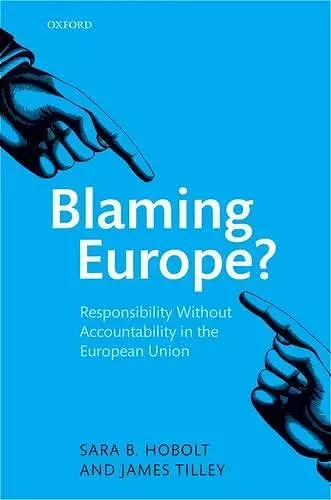Blaming Europe?
Responsibility Without Accountability in the European Union
Sara B Hobolt author James Tilley author
Format:Hardback
Publisher:Oxford University Press
Published:13th Feb '14
Currently unavailable, and unfortunately no date known when it will be back

A key component of democratic accountability is that citizens understand 'who is to blame'. Nonetheless, little is known about how citizens attribute responsibility in the European Union or how those perceptions of responsibility matter. This book presents the first comprehensive account of how citizens assign blame to the EU, how politicians and the media attempt to shift blame and finally, how it matters for electoral democracy. Based on rich and unique data sources, Blaming Europe? sheds light on all three aspects of responsibility in the EU. First, it shows that while institutional differences between countries shape citizen judgements of EU responsibility, those judgements are also highly determined by pre-existing attitudes towards the EU. Second, it demonstrates that neither politicians nor the media assign much blame to the EU. Third, it establishes that regardless of whether voters are capable of accurately assigning responsibility, they are not able to hold their EU representatives to account via the ballot box in European elections due to the lack of an identifiable 'European government' to reward or punish. As a consequence, when citizens hold the EU responsible for poor performance, but are unable to sanction an EU incumbent, they lose trust in the EU as a whole instead. In conclusion, it argues that this 'accountability deficit' has significant implications for the future of the European Union.
Blaming Europe is an important and timely work that is likely toset the agenda for academic analysis of EP elections. It will also beof value to those interested in attributions of responsibility more generally: the combination of the institutionalist clarity of responsibility' paradigm with work on psychological biases in responsibility attributions is an innovative and significant contribution to the broader literature. * Christopher Prosser,Political Studies Review *
This subtle, careful and clever book sets out to clarify a mystery - the mystery of how accountability for public policy is bestowed on public actors and institutions in the European Union... Because the problems are so carefully laid out, the solutions are quite subtle and deserve widespread consideration. This fine book should be widely read by those who are concerned about the quality of governance in the European Union and its member states. * Professor Mark Franklin, Inaugural Stein Rokkan Professor of Comparative Politics at the European University Institute; Visiting Scholar at MIT *
The relationship between the EU and the citizens of Europe is troubled. Like in a crime story, a major question is who to blame, i.e. who's done it? In their book Hobolt and Tilley provide a compelling and comprehensive analysis of this intricate question. The result is a theoretically rich, empirically impressive, state of the art comparative analysis which is pushing our thinking in this field a big step forward. * Professor Claes H. de Vreese, Professor of Political Communication, University of Amsterdam *
This is modern political science at its very best: addressing an important and topical question (the legitimacy crisis in the EU), and answering the question with a clear theory and careful data analysis. This should be essential reading for researchers and students of democratic politics in Europe as well as of public opinion towards globalisation. Also, the finding that citizens can allocate responsibility in Europes multi-level polity correctly if they have good quality information has important implications for policymakers, politicians, journalists and opinion formers. * Professor Simon Hix, London School of Economics and Political Science *
Does multilevel governance blur political responsibility? In Blaming Europe? Responsibility without accountability in the European Union, Sara Hobolt and James Tilley argue that citizens form judgments on the basis of information and bias. If information is poor, citizens fall back on prior EU views which color perceptions. Using a wealth of evidence they demonstrate how policy-specific information is scarce in the EU, and this deprives Europe of a transparently responsible government. The upshot is a paradox: ambiguity protects the EU from getting punished at the ballot box, but exposes it to eroding trust in EU institutions. This is a truly brilliant book that gets to the heart of EU politics in clear and compelling language and opens up new lines of inquiry concerning political responsibility in multilevel systems. * Professor Liesbet Hooghe, W.R. Kenan, Jr. Distinguished Professor of Political Science, University of North Carolina at Chapel Hill *
ISBN: 9780199665686
Dimensions: 240mm x 162mm x 21mm
Weight: 458g
208 pages